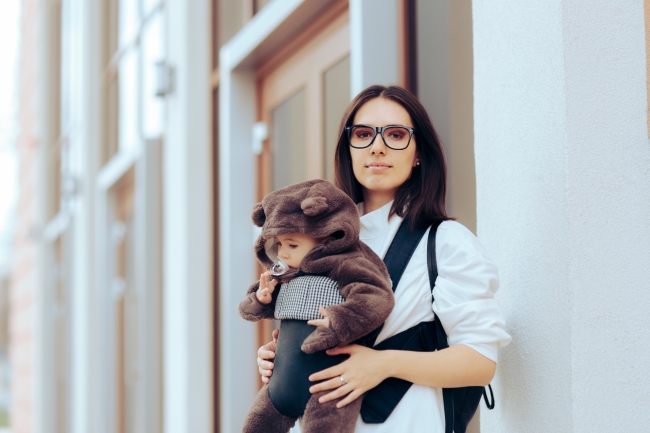You have /5 articles left.
Sign up for a free account or log in.

nicoletaionescu/iStock/Getty Images Plus
In 2021, Maggie Doherty wrote about the quiet crisis academic parents on the tenure track faced at the time, stating that “academic parents must also grapple with the culture of the academe, which remains hostile to family life.” If the crisis for academic parents was “quiet” in 2021, we should be louder in 2023.
I am an untenured faculty member, a mother and a young(ish) scholar, and I am not OK. And I can with certainty attest that most parents of young children in academe are not OK. In the past months, my family has been through RSV, the flu, strep A, two colds and finally COVID, which my husband and I are still not fully recovered from as we continue experiencing severe brain fog, migraines and extreme fatigue.
The fact we managed to avoid COVID until 2023, is, I guess, a cause for celebration and a testament to how incredibly cautious we’ve continued to be three years after the pandemic began wreaking havoc on the world and our lives. But my husband and my two kids, ages 2 and 6, have spent months together in various periods of quarantine, while facing ER visits, innumerable urgent care visits and several doctor and specialists’ visits. We experienced all that along with constant calls to pick up our youngest child from daycare because various teachers’ kids had fallen ill and the center had shut down due to staff shortages. From August to December of 2022, my youngest son was home with us for more 30 weekdays. We are beyond lucky to have insurance, some flexibility of schedule and resilient kids. Yet still, we are not OK.
Audre Lorde’s defense of self-care—“caring for myself is not self-indulgence, it is self-preservation, and that is an act of political warfare”—rings through my brain fog as a daily mantra that I’ve turned to throughout my academic life. Lorde reminds me that I matter, that I need to breathe to live, that taking a walk at the expense of not producing is OK. She reminds me that not answering an email within the hour is OK, that existing outside of work is OK, that saying no to extra work is OK.
But while I practice self-care in my pedagogy, in my life, with my children and in my relationships, I find that the true acceptance of self-care as a radical act is not a practice that academe fosters. I often wonder if academe can possibly ground a practice of self-care within its institutional walls. So far, I have not found that to be true, though I desperately search and try to balance the ethos of go-go-go and produce-produce-produce with my own needs as a human being.
I teach my students self-care practices in every class. I begin with group meditations where we sense each other’s breaths and bodies in one space and learn about what it means to practice empathy in our classroom communities. For the past few years, in end-of-semester reviews, students, almost unanimously, have expressed the value of those few minutes together, approvingly valuing a radical act that should not be so radical. I often wonder how we can also manifest the practice of self-care for faculty and staff members across the country, especially those who are continuing to suffer through the pandemic in distinct ways. Can academe ever be a place where self-care is practiced actively and deliberately? Can it ever be truly emphasized?
I am grateful for my job. I love teaching where I teach, and several mentors, friends and the campus at large have provided me a strong sense of community. Yet since the onset of the pandemic, my partner and I have been scrambling to manage two careers (he is also an assistant professor), two kids, constant school shutdowns and illnesses—all as we’ve been persistently told that life is back to normal, with the expectations that come with that.
The fact is that nothing has been normal since the pandemic. This is especially true if you are a parent of young children. For us, the pandemic never ended; it just brought on new structural problems that we must manage weekly— from school shutdowns to more sicknesses, to not having full-time care for eight months and so on and so forth. And while one year added to a tenure clock is a wonderful gift, it does not make up for the three years many of us have spent juggling careers and dealing with research trips that could not happen, the utter lack of consistent childcare and the influx of illness, not to mention the long COVID many faculty members are still experiencing. The general trauma that the pandemic has inflicted on parents and other care providers throughout the country, especially in small communities like the one I inhabit, is beyond measure, beyond words.
We Are Not OK
I often find myself thinking that motherhood—parenthood, for that matter—is not compatible with academe. On better days, I convince myself, usually after teaching a great class, that this is what I am meant to do. I am meant to be here, I worked hard for this, I can do this, I should be grateful for this, my parents immigrated to this country to give me the opportunity for this. On worse days, I find myself scrambling to see what short block of time I can fashion to send in a conference paper or respond to 30 emails while both my kids are home for the week, yet again.
I had my first child when I was in graduate school, and perhaps the anxiety of motherhood and academic life really started there. I truly became the elephant in the room in most of my classes during my pregnancy, while discussions with advisers would often end with questions as to why I decided to have a child so early. (I was 29.) There were also, of course, the fun job market interviews where I had to think about how to best camouflage my protruding belly. I was made to feel like I made the wrong choice in having my first son. It took years to let the feeling go, to remind myself that becoming a mother did not make me less of a teacher or scholar.
I truly value my teaching and scholarship, but in the last few years, I have considered whether I should drop out of academe more times than I care to admit. As a feminist scholar, I immediately negate such thoughts and tell myself to toughen up. But toughening up is a scary gendered-value system that I can no longer endure. I have been “tough” my whole life. I have figured things out on my own, in a new country, learning a new language, inhabiting a new world. And as a woman, I have been tough in more ways than I can comfortably describe here.
I am tired of being tough and want to embrace my vulnerability. Part of the beauty of parenthood is becoming vulnerable—more vulnerable than ever imagined. So, I loudly and vulnerably proclaim that we are not OK.
And colleges and universities should actually do something about it. Providing extensive mental health programs—therapy, acupuncture, other wellness ventures—should be a priority goal for higher education. Each institution should offer such programs for faculty and staff members as well as for students. Untenured faculty members should be protected from the constant demands and overcommitments in service to their departments and institutions. And, certainly, an extension on the tenure clock should be considered—especially for those faculty members who continue suffering the pandemic’s structural problems, from the childcare crisis to the exposure to long COVID. Making parenthood, and especially motherhood, more compatible for academic parents is something institutions should prioritize.
Institutions can do several things to make that happen. To name just a few, they can host events that are family-friendly. They can protect untenured faculty from service commitments outside work hours. And they can be more considerate in acknowledging the severe and often deleterious impact that the constant systemic juggling we have been doing for almost four years has had on our ability to thrive.








